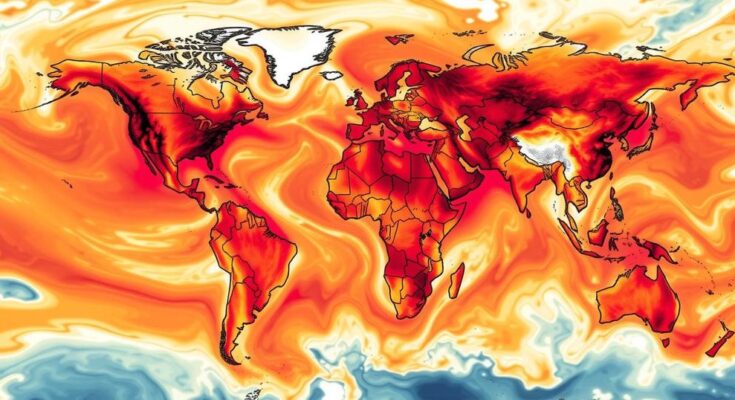In 2024, climate change resulted in an average of 41 extra days of extreme heat worldwide, contributing to the deadliest weather conditions observed in years. Research indicates that human activities have intensified problems such as heatwaves, droughts, and cyclones, disproportionately affecting vulnerable populations. Immediate action is crucial to mitigate further impacts and adapt to ongoing climate challenges, as the world inches closer to surpassing critical temperature thresholds.
As of 2024, human-induced climate change has caused an average of 41 additional days of extreme heat globally, according to research from experts affiliated with World Weather Attribution and Climate Central. This year was marked by unprecedented climate records, with many areas experiencing severe weather events that are predicted to make 2024 one of the hottest years on record. Climate scientist Friederike Otto noted that climate change significantly intensified various weather phenomena, from heatwaves to droughts and tropical storms, resulting in devastating impacts on communities worldwide.
Regions like Northern California, Mexico, and West Africa were among those particularly affected, facing soaring temperatures that compromised public health and safety. Some places reported over 150 days of extreme heat. Kristina Dahl from Climate Central highlighted that the nations least equipped to cope were experiencing the worst impacts. Unfortunately, fatalities linked to heat events are frequently underreported, complicating public awareness efforts about their dangers.
In analyzing extreme weather patterns, researchers found clear links to climate change in 26 out of 29 recorded events that collectively resulted in thousands of deaths and widespread displacement. The ongoing El Niño phenomenon has further exacerbated weather extremes, but climate change is identified as the more dominant factor in this year’s alarming trends. Jennifer Francis, from the Woodwell Climate Research Center, concurred, noting that extreme weather will persist unless measures to lower greenhouse gas emissions are implemented.
The United Nations Environment Programme has warned that without corrective action, the trend of increasing climate extremes is likely to continue, as greenhouse gases accumulate in the atmosphere due to fossil fuel use. Conversely, Julie Arrighi of the Red Cross Red Crescent Climate Centre pointed out that proactive adaptation and preparedness can mitigate the adverse effects of climate change, encouraging all nations to participate actively in these efforts.
The ongoing challenges posed by climate change have become increasingly evident, particularly in light of the extreme weather events of 2024. This year, marked by an alarming rise in average temperatures and days of severe heat, has wiped out previous climate records. As scientists point out, climate change exacerbates weather phenomena such as droughts, heavy rainfall, and cyclones, leading to devastating consequences for countless individuals across the globe. This backdrop sets a critical tone as researchers emphasize the urgency of addressing climate change. In the context of findings shared by World Weather Attribution and Climate Central, it is paramount to comprehend how these extreme weather patterns not only threaten environmental stability but also human lives, especially in underdeveloped regions that are less resilient to climate impacts. The overall implication is a call for action—emphasizing the role of every nation in combatting climate change and mitigating its effects on communities, economies, and ecosystems.
The findings of 2024 highlight a concerning trajectory in climate patterns attributed to human activities, significantly increasing instances of severe heat globally. The data illustrates that climate change has directly influenced extreme weather events, with a notable increase in heat-related challenges anticipated if fossil fuel dependency continues. However, the research also suggests that adaptation and preparation measures can help alleviate the adverse impacts of these climatic changes, underscoring the importance of international cooperation in addressing this global crisis.
Original Source: www.theweek.in




